Key takeaways:
- Equal pay advocacy seeks to ensure equitable compensation for similar work, regardless of demographics, and is driven by a personal and emotional understanding of its impact.
- The importance of equal pay extends beyond financial equity, fostering workplace morale, motivation, and inclusivity, ultimately benefiting individuals, families, and communities.
- Effective strategies for advocacy include storytelling to personalize the issue, building coalitions for a united front, and leveraging social media to engage wider audiences.
- Participating in advocacy provides personal growth opportunities, a sense of purpose, and valuable connections that enrich both personal and professional lives.
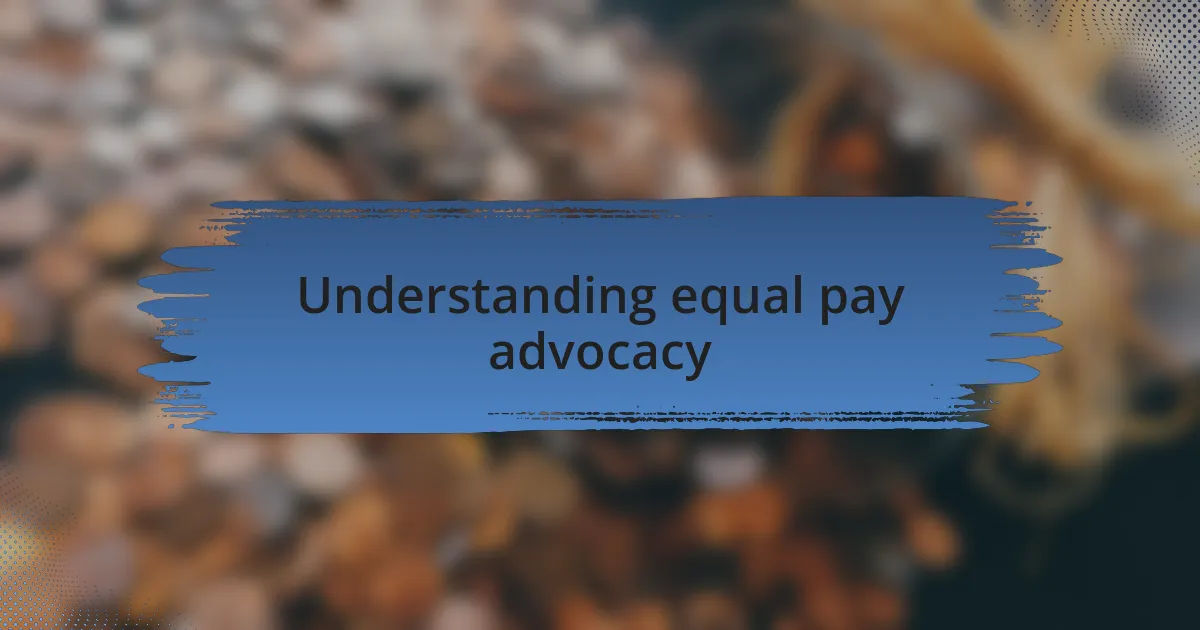
Understanding equal pay advocacy
Equal pay advocacy centers on the principle that all individuals should receive the same compensation for comparable work, regardless of gender, race, or other demographics. I often find myself reflecting on the countless conversations I’ve had with colleagues who, despite their qualifications, have experienced pay disparities simply because of who they are. Isn’t it disheartening to think that personal worth can be reduced to a mere number on a paycheck?
The fight for equal pay isn’t just a statistical issue; it’s deeply personal and emotional. I remember supporting a friend who tirelessly campaigned for salary transparency at her workplace, only to discover that men in similar roles were earning significantly more. How did she feel when faced with this disparity? It sparked a fire within her, motivating her to bring awareness to this critical issue—but it shouldn’t have to come to that for anyone.
Advocacy in this realm involves educating ourselves and others about these disparities and pushing for systemic changes. I often ask myself what role I can play in this movement. Each conversation I have unfolds new layers of understanding, reaffirming the need to challenge the status quo and ensure fairness in the workplace. Have you thought about who might benefit from joining this conversation?
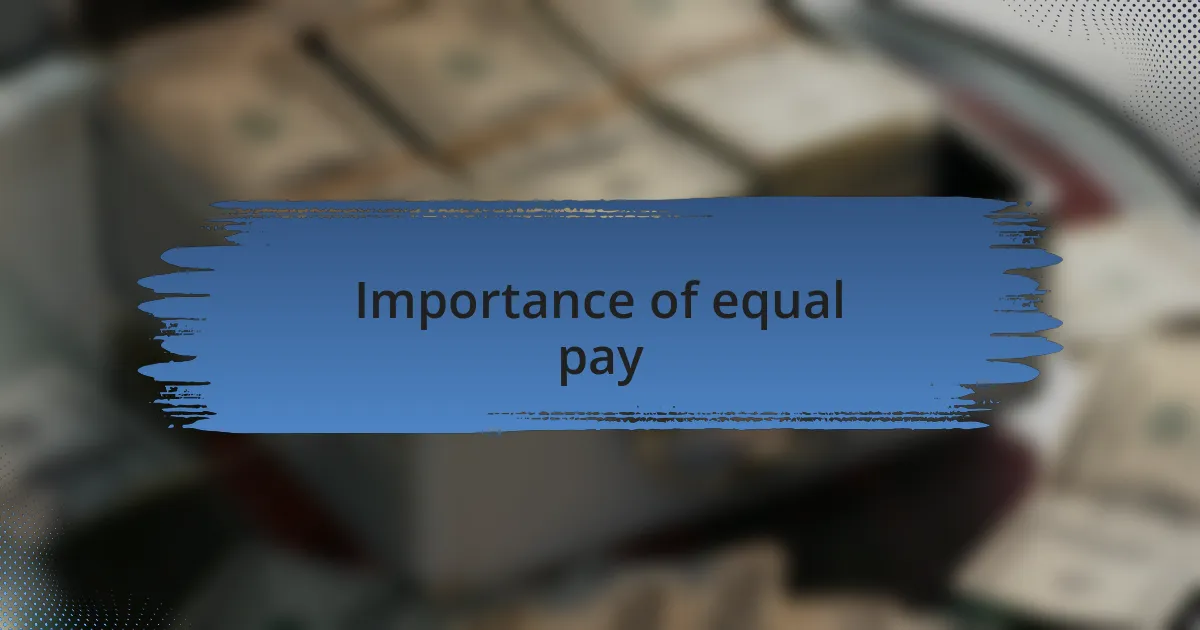
Importance of equal pay
The importance of equal pay goes beyond numbers; it directly impacts the well-being of individuals and families. I recall a time when a colleague expressed her frustration over juggling bills and childcare while knowing she was paid less than her male counterpart. How many more people are silently struggling like her, feeling the weight of inequity in their lives?
When pay is equitable, it cultivates a sense of belonging and motivates employees to fully invest in their work. I once participated in a workshop where we discussed how fair compensation can enhance team morale. One participant shared that receiving equal pay made her feel valued and respected, sparking a renewed passion for her role. Isn’t it interesting how feeling appreciated can lead to greater productivity?
Moreover, equal pay is crucial for fostering diverse workplaces that reflect our society. I often think about how different perspectives can drive innovation, yet disparities can stifle those opportunities. If we champion equal pay, are we not also creating a more dynamic and inclusive environment for everyone to thrive?
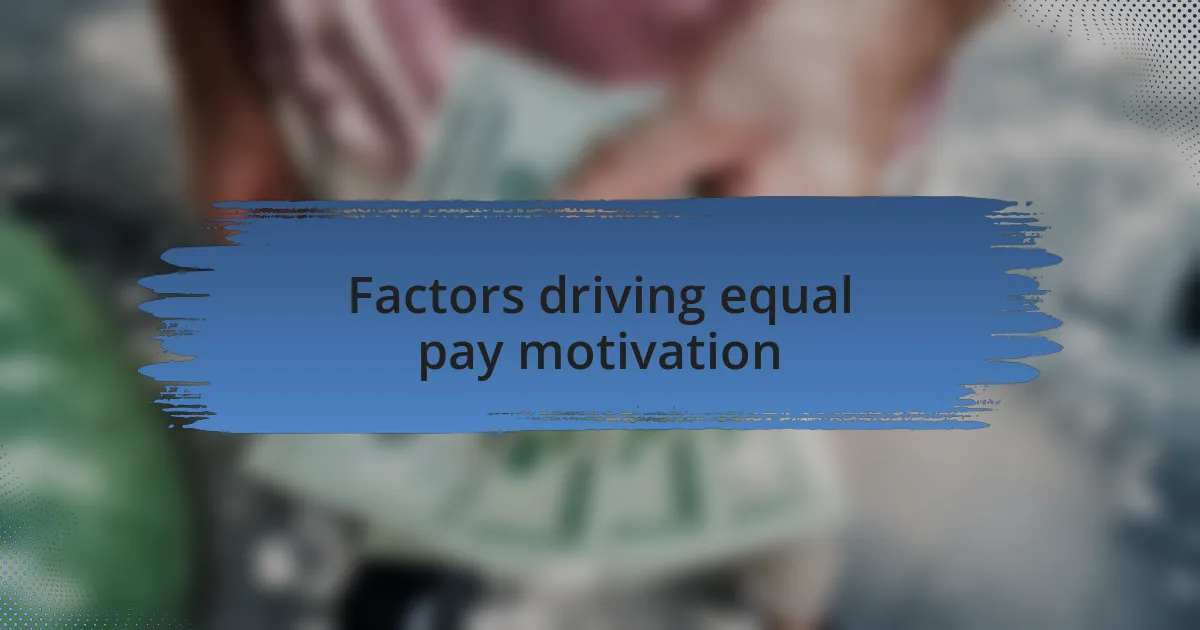
Factors driving equal pay motivation
One major factor driving motivation for equal pay is the impact it has on personal financial stability. I recall a conversation with a friend who was constantly stressed over how to manage her debts. She shared that if her paycheck had matched her male peer’s, she would have had the freedom to pursue a passion project that could’ve led to personal growth. Isn’t it eye-opening to realize how one’s financial situation can limit dreams?
Another key aspect is the desire for fairness in our workplace cultures. I once attended a meeting where a team member passionately argued for transparency in pay structures, sparking a heated discussion. That moment highlighted a collective yearning for equality—many felt that knowing their contributions were valued equally could create a more united team spirit. Have you ever felt that camaraderie can shift the dynamics at work?
Finally, the ripple effects of equal pay extend beyond individual motivations; they play a crucial role in societal change. I have seen communities rally around the cause, igniting conversations about respect and opportunity. Witnessing someone take a stand for equal pay can be profoundly inspiring—who wouldn’t want to be part of a movement that fosters justice and equality?
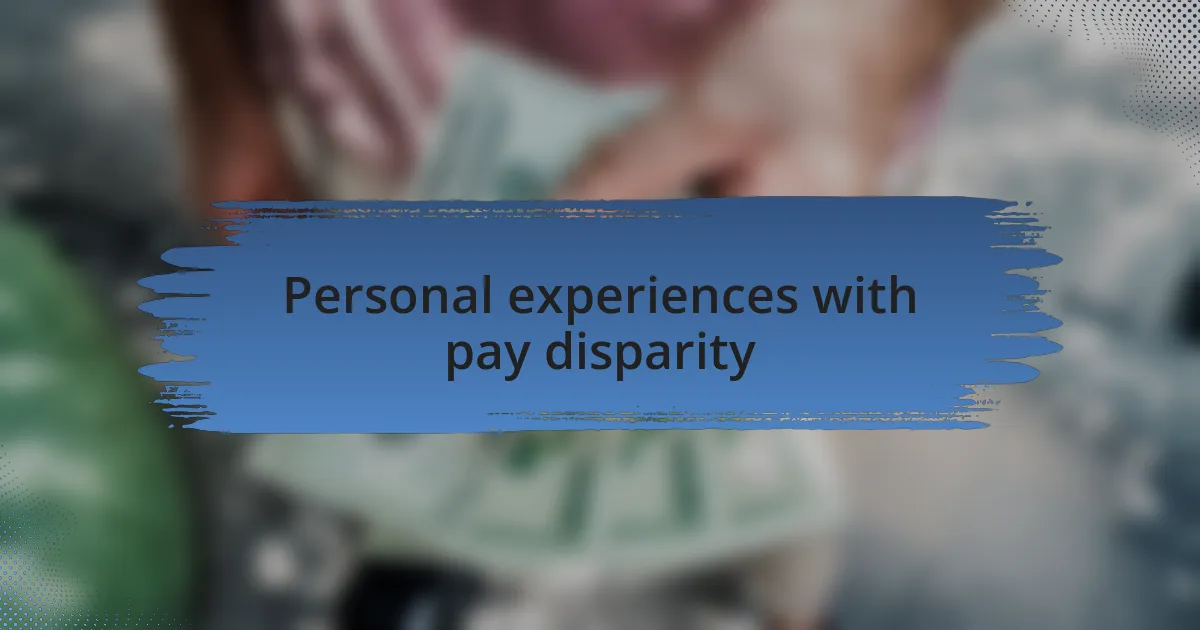
Personal experiences with pay disparity
It’s hard to forget the moment when I discovered that a colleague in a similar role was earning significantly more than I was, despite our comparable experience and responsibilities. The feeling of betrayal washed over me, not just for myself, but for every woman who had ever faced this issue. How can we build a supportive workplace when there are such glaring inequalities?
In another instance, I witnessed a friend turn down a promotion because the pay increase was modest compared to her male peers in similar positions. I remember feeling frustrated on her behalf, knowing that her skills and dedication deserved recognition beyond what the numbers reflected. It made me wonder: what impact does this have on women’s ambition in the workforce?
Reflecting on these experiences, I’ve often thought about how pay disparity can impact morale and motivation. When individuals feel undervalued, it diminishes their enthusiasm for their work and their commitment to the organization. Could addressing these disparities be the key to unlocking a more productive and harmonious work environment?
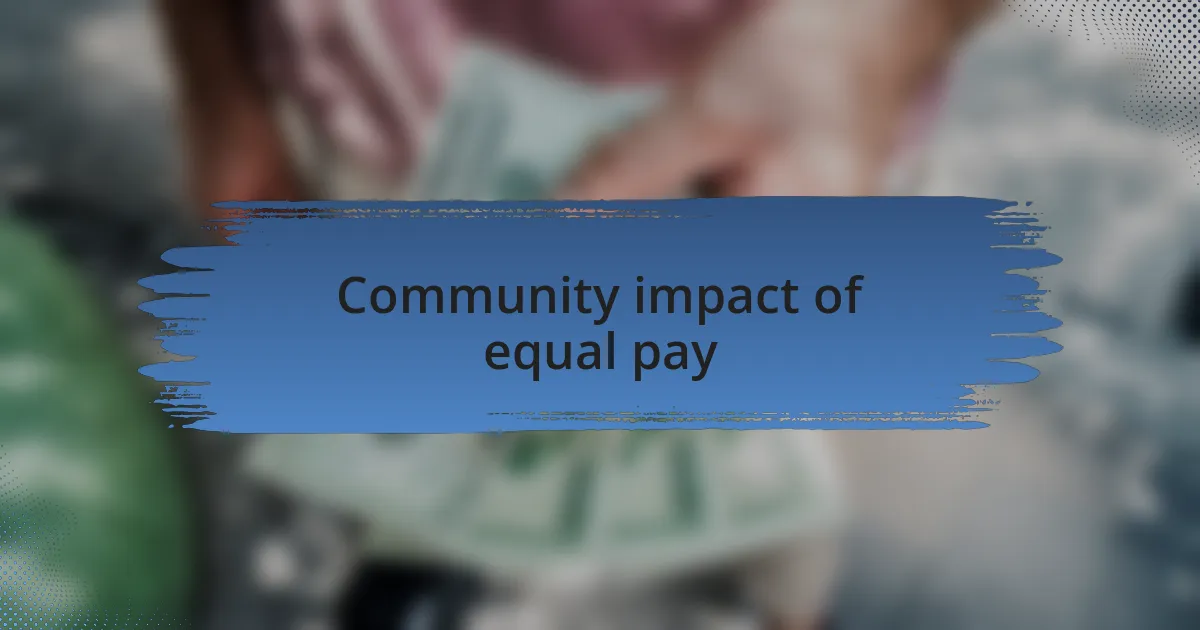
Community impact of equal pay
When equal pay is achieved within a community, the ripple effects can be profound. I recall attending a local town hall meeting where residents discussed the benefits of fair wages. As one speaker highlighted, families could afford better healthcare and education, leading to improved overall well-being. It made me think: isn’t this the type of community we all want to cultivate?
Furthermore, I noticed a surge in local entrepreneurship as women felt empowered to pursue their own business ventures. Friends of mine who had previously hesitated to start companies because of financial insecurity found the courage to take that leap once pay equality became a reality. This shift not only diversified the local economy but also inspired a sense of solidarity among community members.
Lastly, I often reflect on how equal pay fosters a sense of worth among individuals. When everyone receives fair compensation, there’s a collective boost in confidence and motivation. It warms my heart to see colleagues thrive as they realize their value—not just to their employers but to their entire community. So, I can’t help but ask: what transformative change could occur if we all prioritized equal pay?
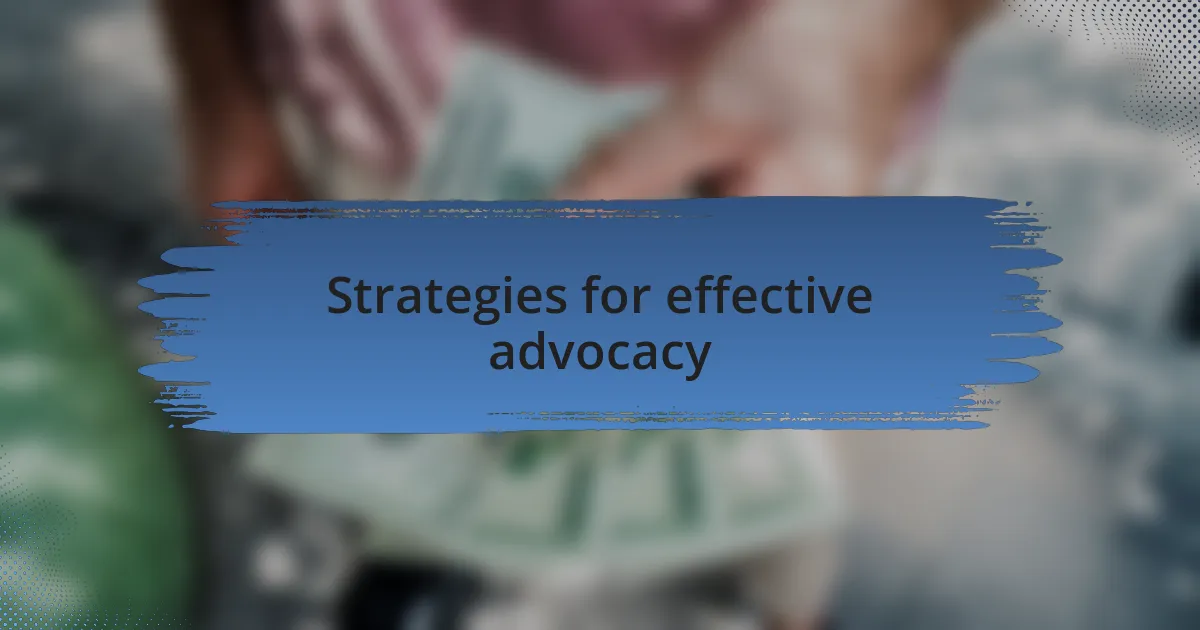
Strategies for effective advocacy
Advocacy for equal pay requires a multifaceted approach. One effective strategy I’ve seen in action is the power of storytelling. During a recent workshop, participants shared personal experiences about pay disparity, and it struck me how these stories humanized the issue. When we relate statistics to actual lives impacted, it resonates much deeper with the audience. Why does storytelling work so well? It evokes empathy and can motivate even the most indifferent listeners to take action.
Another vital strategy involves building coalitions across diverse groups. I once joined forces with several local organizations, each focusing on different aspects of social justice. It was inspiring how our combined efforts amplified our message about equal pay. Working together not only pooled our resources but also brought diverse perspectives to the table. If we unite our voices, how much stronger will our impact be? Together, our advocacy becomes a force that is hard to ignore.
Lastly, leveraging social media is essential in today’s advocacy landscape. I remember launching a campaign on a popular platform, and within hours, the engagement was overwhelming. Sharing statistics, personal stories, and calls to action captured the attention of a broader audience. The internet can feel like a vast ocean, but when we engage authentically, we can create impactful waves of change. Are we really harnessing these platforms effectively in our advocacy efforts? Social media is an opportunity we must seize to amplify the equal pay message and engage younger generations.
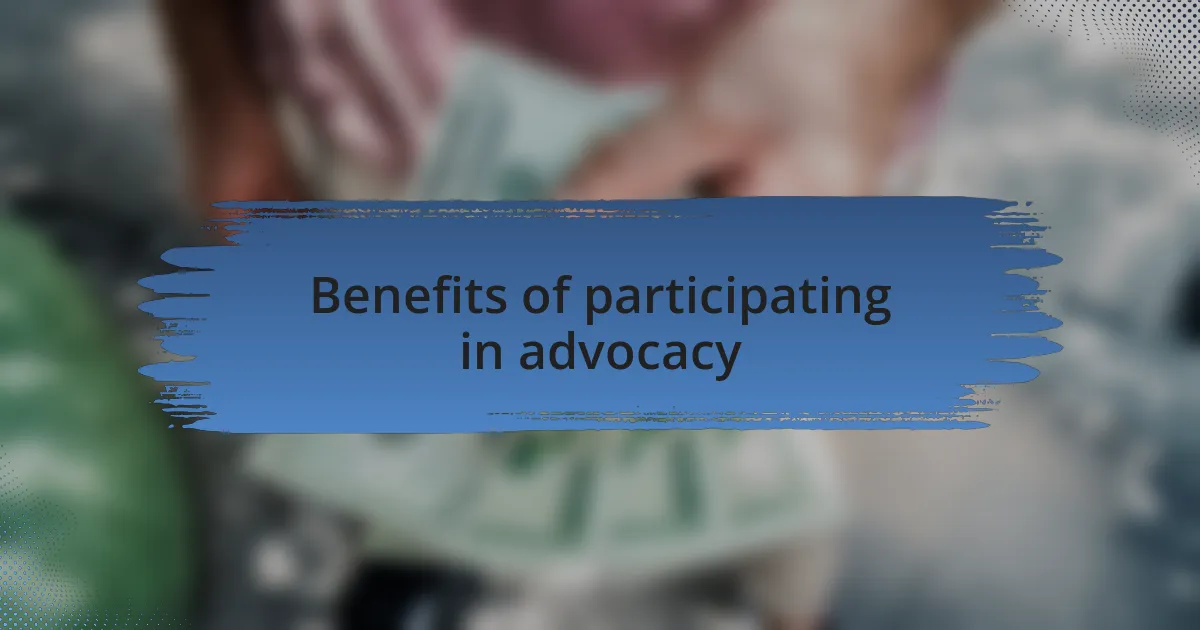
Benefits of participating in advocacy
Participating in advocacy offers a powerful sense of purpose. When I first got involved in advocating for equal pay, I felt an exhilarating rush knowing that my voice contributed to a larger cause. This engagement not only fuels my passion but also nurtures a commitment to foster change in society. Isn’t it amazing how contributing to something bigger than ourselves can reignite our sense of direction and motivation?
Moreover, advocacy enhances personal growth and skills development. I remember attending a local advocacy workshop where I honed my public speaking skills while presenting our campaign’s goals. Through this experience, I gained confidence and learned how to articulate my ideas more clearly. How many opportunities do we have to grow personally while fighting for what is right? Involvement in advocacy provides a platform for honing skills that are beneficial both within and outside the realm of activism.
Finally, the connections made through advocacy can be incredibly rewarding. I’ve met so many passionate individuals who share the same vision for equal pay, turning mere acquaintances into lifelong friends. It’s heartening to work alongside others who are equally motivated to push for change. Doesn’t that sense of community make the journey even more fulfilling? Networking in advocacy opens doors for collaboration and support beyond just the campaign itself, enriching both our personal and professional lives.